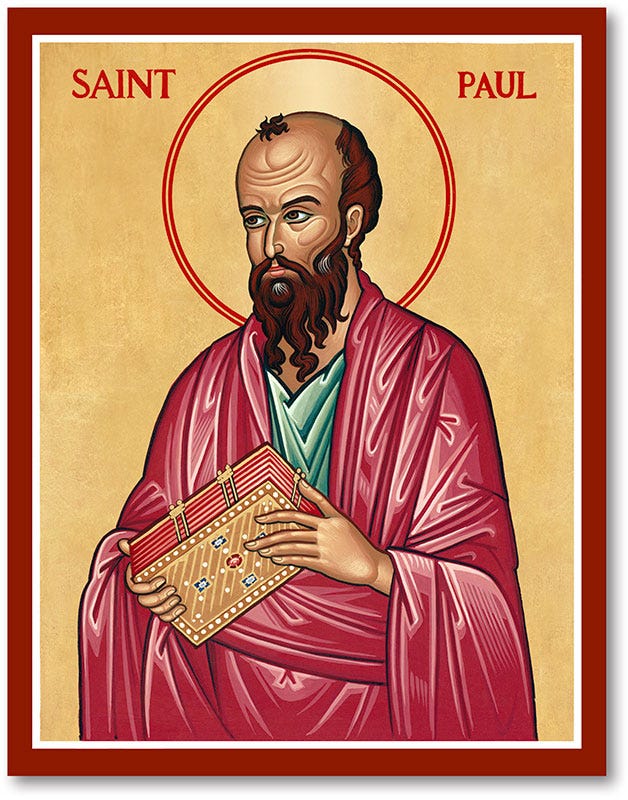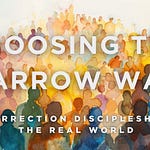First, I want to begin by saying how thankful I am to you for allowing me to be away for the past two Sundays. The journey with Saint Paul to Italy, Greece, and Turkey was a trip and blessing I will not soon forget. I need to offer a special thanks to Dawn, Mack, James, and Christiane for their leadership in worship while I was away. Worshipping with you from Gate A32 in the Frankfurt airport and the middle of the Mediterranean Sea was a reminder of the ways the grace of God cuts across time and space.
So, I spent the last two weeks following the travels of Saint Paul. One of the places our group visited was Corinth. Corinth was home to the Corinthians, the first recipients of our scripture reading. Corinth was a city of contradictions – an ancient melting pot of wealth and poverty, high society and rough neighborhoods, religious fervor, and moral chaos. In many ways, Corinth was not much different from our world today.
One of the things that hit me like a ton of bricks as I traveled with Paul was how deeply Paul cared for each of the cities he visited. To say Paul visited cities like Corinth, Ephesus, and Athens is an understatement. Paul lived among the people. He learned what made them tick, about their passions, and how they were experiencing the world and thus how they were encountering our risen Lord. Even when faced with adversity, Paul never lost hope in the people to whom he had been sent to minister.
The early church in Corinth had its own struggles – agendas that contradicted God's grace, divisions within the church, and inequality at the Lord's table. Throughout Paul's letters, he spoke directly about these issues while also addressing us today.
Saint Paul addressed the sacrifice of Christ and the gift of salvation in his letter to the Corinthians, and at the same time, he confronted divisions within the body of Christ. Some in the Corinthian church were eating and drinking to excess, while others were left hungry and excluded. Paul condemned this practice, saying, “For anyone who eats and drinks without discerning the body of Christ eats and drinks judgment on themselves.”[i]
Paul is not simply addressing their failure to recognize the bread as Christ's body – he is confronting the church's failure to recognize themselves as Christ's body.
Rev. Fleming Rutledge writes, “The church does not exist for itself. It exists to become the living embodiment of the One who has torn down the dividing walls of hostility.” When we come to the table, we are not individuals coming to receive a personal blessing. We are participants in the great cosmic work of reconciliation and salvation that Christ has accomplished. The reconciliation and salvation of Jesus Christ includes you – every person who confesses Jesus as Lord – but also stretches beyond us to include all of creation.
Bishop Will Willimon says it this way: “At this table, Jesus confronts us with the scandalous idea that we are one—not because of our common interests or political convictions, but because Jesus has made us one.”
Christ has broken down the dividing walls – not just the walls between us and God but the walls we insist on building between one another.
And here is where the late theologian Robert Capon opens our eyes even wider. Jensons says, “At the Last Supper, Jesus does not just change bread into His body. He changes the meaning of the world.” In other words, Communion is not just about remembering the past—it is about embracing the cosmic reality of Christ's lordship over all things. Every time we take this meal, we proclaim that Christ's death and resurrection have redeemed all of creation. This transformative power of Communion gives us hope and inspiration in our daily lives.
We live in a world that is deeply divided—by politics, race, geography, and culture. Yet, every time we come to this table, we are declaring that Christ has already overcome those divisions. This is not just wishful thinking or a distant hope; it is a reality that we are invited to participate in here and now. The bread and the cup are signs of the new creation breaking into our broken world.

Today is World Communion Sunday. Across the globe, Christians are gathering around tables just like ours, breaking bread and sharing a cup. We gather not just as a local church, not just as a congregation of The United Methodist, but as part of the great body of Jesus Christ – spanning nations, cultures, and generations. Christ's table of grace unites us across the barriers of geography and time. And, every time we come to Christ's table, we remember and proclaim that God has reconciled all things in and through Jesus Christ. This global unity in Christ is a powerful reminder of our shared faith and purpose.
When we come to this table, we proclaim that through Jesus Christ, the rich and the poor, the powerful and the powerless, the insider and the outsider are one. We are one in Christ Jesus because of his faithfulness. This inclusivity of the Communion table reminds us that we are all equally valued and accepted in the eyes of Christ.
Paul's call to the church is to examine ourselves before and as we come to the table. Not so that we can be perfect but so that we come with a proper heart. It is not about being worthy of this meal; it is about recognizing that none of us are worthy, yet, all are invited.
We come to this table by grace, just as the generations that are now dust did and as generations to come will. The grace of God calls to us to look beyond ourselves, beyond our communities, beyond our nation, and to see the breadth of what God has done and is doing.
So today, we come to the table to share a meal in unity with the body of Christ from every corner of the globe. We gather knowing that this table and meal are not just a symbol of unity but rather is the place where Christ makes that unity a reality. And as we leave, we carry that unity with us to be a people who have been changed by the love and grace of Christ in everything we do.
[i] 1 Corinthians 11:29
















Share this post